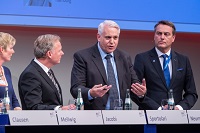CEP firms in Germany should cooperate more and find innovative solutions to avoid an urban logistics ‘Wild West’ as parcel volumes surge and authorities eye tougher city centre traffic restrictions, according to experts and executives.
Those were the urgent messages from various speakers in two sessions on urban logistics at last week’s German Logistics Congress in Berlin. Organised by the German Logistics Association (BVL), the three-day event attracted more than 3,500 delegates, including many high-ranking supply chain and logistics managers from German and international companies and organisations.
Presenting a joint study with the BVL entitled ‘Urban Logistics 2030 – Together against the Wild West’, Tobias Schönberg, senior partner with consultancy Roland Berger, highlighted “critical uncertainties” such as tougher traffic restrictions and potential bans on diesel vehicles, and urged more cooperation between last-mile delivery operators to cope with rising volumes.
The logistics expert outlined four possible scenarios for 2030:
– An undesirable ‘Wild West’ of countless individual delivery solutions with heavy traffic and environmental impacts
– ‘Regulated diversity’ with a mix of last-mile restrictions and incentives
– A regulated ‘city platform’ for consolidated deliveries by a single licensed operator
– ‘Coexistence of giants’ with several self-regulated delivery platforms run by current major players or new technology-based ‘white-label’ operators
Local authorities needed to think about active or passive regulation for urban logistics and involve citizens in their planning, while logistics companies should think about how to make cooperation projects work better, Schönberg said. “If we do not do all this, then there is a big danger of the Wild West in the future,” he declared.
Christian Jacobi, managing partner of Agiplan and chairman of BVL’s urban logistics working group, said plenty of good ideas and technical solutions already exist, but “we need dialogue between all participants… we have no time to lose”. Logistics expert Prof. Uwe Clausen pointed out that there are at least 40 different last-mile projects in Germany at present, covering alternative delivery forms, micro-depots, autonomous vehicles, cargo bikes, and other topics.
In a panel discussion, UPS Germany president Frank Sportolari hailed the success of a project in Munich to make last-mile deliveries by cargo bike and on foot, which had been well-received by customers and also created additional space in depots.
He criticised the idea of consolidated deliveries by a single operator, pointing out that every CEP firm had its own different products, services and IT systems. Overall, “the market will decide” which last-mile delivery models work in practice, he emphasised.
Wibke Mellwig, head of port & logistics affairs for the city of Hamburg, said the city’s SMILE last-mile delivery project, which includes shared usage of micro-depots, was going well and noted there was not sufficient available space in city centres for every CEP firm to have its own micro-depot container.
In a separate presentation, Hermes Europe CEO Carole Walker underlined the importance of customer focus in view of the forthcoming “huge” increase in parcel volumes, and challenges such as the shortage of drivers and rising labour costs, as well as new restrictions for city centre deliveries.
Hermes, which delivered 766 million parcels last year, has introduced new services to put customers “in control of delivery”, improve first-time delivery rates and increase productivity, she explained. These include a mobile app in the UK, ‘Wunschzustellung’ with delivery time-window notification in Germany, and deliveries from parcel shops to homes by bike in France. Deliveries to Smart car boots by last-mile subsidiary Liefery had produced “outstanding feedback” from customers, she added.
Walker told delegates that Hermes plans to introduce 1,500 electric vehicles to its German fleet, initially in 24 cities by 2020 and then all big conurbations by 2025. She also referred to the KOMODO last-mile cooperation project in Berlin, where all five major CEP firms are sharing a single micro-depot but making deliveries separately.
“We want to give a choice of delivery options to consumers… There is no one solution,” she concluded.












